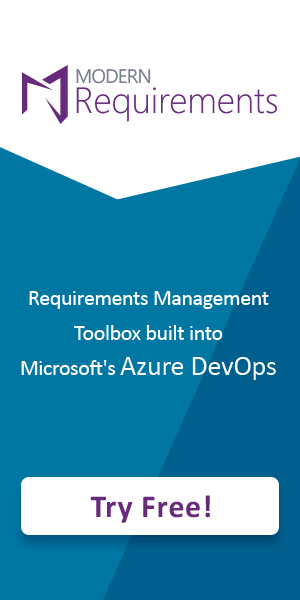Why use Azure DevOps or Azure DevOps Server?
With Modern Requirements, users can take a Microsoft Word or Visio approach to textual and visual requirements authoring. Experience Smart Docs for translating text-based content directly into Work Items, or Diagram their content and marry requirements elicitation and creation through our automatic Use Case, Test Case, and Integration Story generation.

We know that teams want the ability to tackle their requirements management process from any angle.
By fully embedding and integrating our solutions, Modern Requirements ensures that the process of requirements elicitation, authoring, reporting and analyzing is not an isolated one.
Embedding our solutions directly into Microsoft’s Azure DevOps Server (TFS) and Azure DevOps (VSTFS) platforms places our Requirements Management Solution directly within the development cycle.
By extending the functionality of Microsoft’s ALM platforms, Modern Requirements offers a fully unified workflow. Users can now enjoy the ability to create test suites, manage code repositories, collaborate on an inter-team scale, and integrate all of their requirements management efforts. With one database, all Work Items and artifacts created in Modern Requirements4DevOps (aka MR4TFS) are stored in Azure DevOps (TFS/VSTS). There no need to synch data as the Azure DevOps is the system of record or as some like to say ‘The single source of truth’.
Being backed by Microsoft’s commitment to security and integrity, Modern Requirements can remain focused on offering the best Requirements Management Solution on the market. We provide the full benefits of our Requirements Management Solutions for those using Azure DevOps Server (TFS) or Azure DevOps (VSTS).
With our functionality not varying between Azure DevOps Server (TFS) and Azure DevOps (VSTS), you might be wondering why you would choose one platform over the other. Knowing the differences between the platforms will help you decide which implementation will best suit your organization’s unique needs.
Read on to see the differences between Modern Requirements on Azure DevOps and Modern Requirements on Azure DevOps Server.
Why Choose Modern Requirements With Azure DevOps Server (TFS)
Microsoft Azure DevOps as an on-premise solution offers:
- Full control over update rollouts
- Unrivalled levels of security
- Deep, long-standing knowledge base
Azure DevOps Server allows users to incorporate their hardware, their people and their process. As an on-premise solution, the implementation’s security, control and expandability are limited only by a company’s resources, and can easily be adhered to any company’s security standards.
If company standards require information to be stored onsite, implementing Modern Requirements with Azure DevOps Server is the best choice. On-premise implementations allow for full control of how and where data can be accessed. While a Azure DevOps implementation can be accessed from the internet, it can also be set up to only be accessible within a network. These “in closed network” implementations offer a level of security unrivalled by Microsoft’s cloud-based Azure DevOps, without sacrificing the full functionality of Modern Requirements.
Authentication with Azure DevOps Server (TFS) is facilitated through your company’s Active Directory. This affords administrators the ability to update permissions to Azure DevOps Server implementations in bulk using User Groups, and allows users to ‘skip’ a login process as logging into your workstation will provide access to Azure DevOps Server (TFS). In order to manage user access, administrators can add, move and remove users from an Active Directory Group and the permissions to Azure DevOps Server will change accordingly.
Changing access to specific projects and features in Azure DevOps Server can be done through changing the Access Levels. See the link here to see how you can easily manage Stakeholder and user access. Unlike Azure DevOps where all features customization can be accessed through the front end, advanced features like customizing the Process Template on Azure DevOps Server (TFS) will have to be done through the backend.
Azure DevOps Server (TFS) allows for management of update rollouts. If an organization wishes to rollback or even prevent updates altogether, this is possible with Modern Requirements4DevOps (aka MR4TFS). As a fully backwards compatible solution, Modern Requirements will continue to offer quarterly updates for you to test and deploy regardless of your Azure DevOps Server version. New features and updates will still be easily tested and trialed a week before our next Modern Requirements release and can be done in a sandbox environment. With Azure DevOps Server implemented on-premise, updates will have to be coordinated with both Modern Requirements and your system administration team. Updates can be done in off hours and we will work with your team to ensure there are no disruptions in service.
Why Choose An On-Premise Solution?
You want the control of update rollouts, the ability to assign user permissions in bulk with existing Active Directory credentials, and the security of your own on-premise implementation. You want the ability to use your people, your hardware, and your process without sacrificing the functionality of your Modern Requirements implementation.
Why Choose Modern Requirements on Microsoft's Azure DevOps (VSTS)?
Microsoft Azure DevOps in the cloud solution offers:
• Freedom from hardware maintenance and infrastructure vulnerabilities
• Disaster-proof solution backed by a 99% uptime SLA
• 3-week delivery cycle of updates and new features
Microsoft Azure DevOps offers the freedom of a no-hardware implementation and anywhere access for users. With features being delivered every 3 weeks, Microsoft ensures that Azure DevOps users will continuously and seamlessly transition to the newest and best their ALM platform has to offer. Modern Requirements works in partnership with Microsoft to guarantee stability throughout releases. Furthermore, we tailor our quarterly releases to give our users the best in ALM integrated requirements management.
Azure DevOps is a cloud-based solution requiring no locally maintained hardware. Cloud implementations reduce dependency on Sys Admins for customization as all customization is done through the applications frontend interface. UnlikeAzure DevOps Server where much of the customization on a project level must be done through the backend, application settings such as process template customization and more can also be accessed directly through the browser if a user has the correct permissions.
Although DevOps instances cannot offer the security of being deployed in a local environment, they are backed by Microsoft’s security policy commitments. Committed to keeping the Azure DevOps platform fully secure, Microsoft provides extra features to protect access to your projects. For instance, Azure Active Directory allows bulk user management as well as Multi-Factor Authentication and IP restrictions. As with Azure DevOps, Modern Requirements inherits the access level set by Azure Active Directory. Restrictions on Microsoft Accounts can also be set at a project level.
More on enforcing access level restrictions on your Azure DevOps implementation can be found here at this link!
Why Choose A Cloud-Based Solution?
You want the full functionality of Modern Requirements suite paired with latest updates for Microsoft’s leading ALM tool. Modern Requirements in the cloud provides you with a hardware free, cutting edge tool that support requirements management with anywhere access. Pair requirements management with your code repositories and test cases and access them from anywhere with an internet connection. Backed by a guaranteed 99.75% uptime, users can be sure that they have hassle free access to their Modern Requirements implementation whenever they need it.
Author: Bob Savelson
Time to Read: 10 minutes
Related Articles
Request a Demo!
- Schedule a demo with one of our trained product experts.
- Receive a personalized demo that mimics your team's process
- Engage our experts on topics such as workflow or best practices.

Reduce UAT Efforts
50% Reduction in UAT efforts

Proven Time Saving
80% time saving on creating Trace Analysis

Streamline Approvals
Significant reduction in approval delays

Increase Performance
50% requirements productivity improvement

Reduce Rework
10-fold reduction in development rework

Simplify Compliance
40% reduction in compliance reporting efforts


